- Home
- Beth Vrabel
Caleb and Kit Page 4
Caleb and Kit Read online
Page 4
“Mom!” I said again, noticing Shelly sneaking around the edge of the pavilion.
“Ms. Baker,” said Ava, leaning in, the smile stretching to dangerous new levels, “I will learn absolutely everything there is to know about cystic fibrosis tonight and will be prepared to be in constant contact today. Do. Not. Worry.”
Mom’s head jerked back a millimeter. “Okay,” she said. “I won’t.”
Mom leaned down to kiss the top of my head, but I ducked out of her way. “I have to keep you safe,” she murmured.
“I can keep me safe,” I snapped back.
Mom sighed but headed toward the car. I slumped onto a bench farthest from Shelly and put my head on my arms. Suddenly I heard Mom’s voice, slightly out of breath. “One more thing,” she said to Ava, “on days that I know will be too hot or too humid, or times when he just isn’t feeling up to it, Caleb will need to stay home. Should I call you on those days?”
Ava shook her head. “Not necessary. I can mark him down as being one of our drop-in campers. That way, he can come when he’s able but we won’t necessarily count on him being here every day.”
“He is right here,” I said without lifting my head.
“That sounds great,” Mom said over me.
About three hours later, I realized there’s only so much you can do with sidewalk chalk.
Ava was determined we campers “cover the blacktop with color!” (Something she repeated about a thousand times.) I had dragged out snack time, slowly eating a couple cookies meant for lunch dessert in addition to the apple with peanut butter Mom had labeled Snack. (She’s a little intense about how much I eat and when.) But soon there was nothing left to do but pick up a piece of chalk and hunker down on a bare patch of blacktop.
“Wanna help me draw a puppy?” a little kid asked, her knees covered in purple and yellow chalk.
“No,” I said.
“How about a princess?”
“No.”
“Why not?”
“Because I’m going into seventh grade and seventh graders don’t draw princesses and puppies.”
The girl’s eyes got super wide. “You’re in seventh grade?”
“Yes.”
“Whoa! I’m in third. Everyone here is in third or fourth, ’cept for her.” She pointed at Shelly. “What do seventh graders draw with chalk?”
I didn’t answer, just wrote My life sucks on the pavement.
The girl scratched out sucks with pink chalk. “Mom says that’s a swear. And you can’t say swears.”
“I wrote it. I didn’t say it.”
“You’re not a nice seventh grader.” The girl stood, crossed her arms, and stomped away to sit next to an apparently nicer kid who was drawing a yellow duck. I turned away from them and drew cube after cube after cube.
“That’s creative,” Shelly snarked.
I glanced at what she was drawing. It was a series of complicated hexagons interlacing. “What’s that supposed to be?” I asked because I was bored, and not because I cared what Shelly was up to.
“A mandala,” she said in an isn’t-it-obvious way. “It symbolizes the universe.”
“Whatever,” I muttered and drew another cube. “So, how did you end up getting stuck here?”
Shelly broke her chalk pressing it into the blacktop. “Ava is my cousin.”
As I drew, I kept glancing up at the port-a-potty. Every time the door opened or closed, the squeaky bang made everyone look. No way would anyone be able to head in there undetected.
“Why don’t you just go already?” said Shelly, following my gaze. “Or are you afraid you’re going to fall in?”
But at that moment, Ava clapped her hands and finally said what I had been both waiting for and dreading all morning. “All right, campers! Time for the pool!” I’d been waiting for this because swimming is awesome. I’d also been dreading it because the pool is open to the public, which meant anyone who was there would see right away that I was at day camp like a baby. At least there’s actual plumbing—and flushing toilets—in the pool house, I told myself.
We grabbed towels from our bags and headed toward the pool in a line behind Ava. “Okay, guys,” she said, and held up her hand for us to be quiet. “We’ve got two hours to swim before lunch. Have fun, and remember to listen to the lifeguards!”
“You’re not going in?” Shelly asked.
Ava shook her head. “Nope, the lifeguards take over watching you guys during pool time. But, listen,”—she leaned in toward Shelly. I paused, too, to eavesdrop—“I promised your mom I’d keep an eye on you. Make sure you made an effort to make friends.”
Shelly stomped away. I waited a few seconds before heading into the pool area, figuring all the kids would run straight ahead into the water. I was right; all of them were already splashing around, with the exception of Shelly, who sat on a lounge chair. She slipped a book out from the middle of her folded towel and buried her nose in it.
When I figured the changing room would be empty, I gave in to the cramping in my gut and ducked into the men’s side. But I was out of luck. Even though all of the other campers were in the water, the changing room was packed with people. A dad was squishing his toddler into a swim diaper. An old man was at the mirrors, adjusting a black swim cap over his wrinkly head. Another kid snapped on goggles and smeared on some sunscreen. Worse of all, a bathroom attendant stood in the corner, playing on an app on his phone.
But it was this or the port-a-potty. Not making eye contact with anyone, I went straight to the toilet and locked the door behind me. It was one of those public bathroom stalls where the door has a half-inch gap so I could still see out. I bit my lip and tried to wait until just about everyone trickled out, then did my business.
The truth is, cystic fibrosis is more than muck-filled lungs and lots of infections, though I was thankful Mom didn’t go into too many bathroom details in her crash course for Ava. The worst part about being a twelve-year-old kid with mild cystic fibrosis, if you ask me, is the poop.
People with CF can have some issues with Number Two, if you know what I mean. Because my body sucks at absorbing the nutrients it needs—especially fat and protein—I have to eat a lot of food. And because my pancreas is whacked-out, getting rid of all that food is an issue. I either have trouble going or I go all the time. All. The. Time.
And, okay, here’s another thing about CF: Not only is the poop a problem, the poop itself is… well, extra gross. I mean, even more than regular poop. Let’s just say Mom lights a lot of candles and we have lots of air filters stationed outside the bathroom at home.
Being stressed out all morning about using the bathroom was making everything—and I mean, everything—worse. I prayed for a silent, quick go. No luck. My lower stomach cramped and rumbled, as if laughing out loud at my prayers.
I pressed my lips together to keep from whimpering and just gave up on holding back.
The attendant coughed. He gagged. “You okay, man?” he asked a minute later.
“I’m fine,” I managed.
“I can call someone if you want. You one of the campers?”
“No! No, I’m fine!”
“Don’t sound—don’t smell—fine,” he muttered. A few seconds later, I heard this high-pitched whizzing sound. I peeked through the gap in the door. The attendant was spraying air freshener directly at my stall.
“Come on, man!” I grimaced. My face was sweaty and all I could think of was finishing this and cooling off in the water.
“You almost done?” the attendant asked.
I flushed the toilet harder than necessary, swung open the door, and stomped to the sink to wash my hands.
“If you’ve got the squirts, you’re not allowed to swim. Pool rule,” Attendant Guy said.
“I don’t have diarrhea. That’s just how my… that’s just how I go, okay?”
“Did an animal die inside you, kid?”
“You know what—”
But whatever I was about to yell at this gu
y—and I didn’t really know what would’ve come out of my mouth, only that it’d be as ugly as what just happened in that stall—was cut short by a rush of guys coming into the bathroom. Great. The football team. This was the first year our town had a football team, so practice began right at the end of the school year. Which meant the team went straight to the pool after practice. Which meant I’d see them all every horrible day of camp.
“Oh, puke!” gagged the first one, Jett. “What the heck happened in here?”
The attendant didn’t say anything, just sprayed more freshener. My own nose crinkled at the new stench—sweat and dirt—as the rest of the guys followed behind Jett. All of them gagged or coughed or covered their noses as they rushed in.
“Ugh! Fried farts and onion!” boomed someone still in the hall, but of course I knew who it was before he entered.
“Hey, Brad,” I muttered, praying the attendant wouldn’t rat me out. Brad was all too familiar with my digestive issues from all the times I spent in the bathroom at his house, so I knew he’d cover for me if anyone pointed a finger in my direction. “Yeah, some old man was just in here. Must’ve had sauerkraut for breakfast or something.”
The attendant coughed, but Brad ignored him.
“Caleb! Sweet! I didn’t know you’d be here!”
“Yeah, Mom dropped me off this morning.” I didn’t mention that it was because of camp, although Brad’s eyes dropped to my T-shirt.
“Cool,” he said, and turned toward his team. “Last one in the water is a loser!”
“Hey!” the attendant yelled over the insults being slung back and forth among the team. “You’ve got to shower before getting in the water when you’re dirty and sweaty. Pool rule!”
But Brad—and then everyone else—ignored him, rushing out to the water. I trailed behind them. “Jerks,” I heard the attendant mutter as he doused the room with more air freshener spray.
“What are you doing here?” Shelly snapped a half hour later when I crashed on the lounge chair next to hers. “Shouldn’t you be out there, with them?”
“I don’t want to swim anymore.” My wet T-shirt stuck to my chest and weighed about a million pounds.
“You know you’re supposed to take your shirt off to swim, right?” Shelly wiped at the drops of water I accidentally flicked onto her when wringing out the corner of my shirt.
“I didn’t feel like it,” I said. More like I didn’t feel like having her point out that she could count my ribs or notice how scrawny my arms are, not that Shelly needed to know any of that. I shook out the shirt, splattering her.
“Overcome with camp pride?”
I turned on my side, away from her. “I didn’t want to take off my shirt, okay? Get over it. At least I don’t come to the pool to read.”
Shelly turned the page of her book with a snap.
“Come on, Caleb! We need another for volleyball!” Brad shouted from the pool.
“Nah, you guys go ahead,” I said.
“Awesome,” Jett called out. “Then we can get started.” He spiked a beach ball at Brad, who, of course, popped it over Jett’s head, scoring a point.
“You smell like chlorine.” Mom buried her nose in my hair as we sat at a red light. She had picked me up from camp to go straight to a checkup.
“I don’t think Dr. Edwards cares what my hair smells like.”
“So, camp,” Mom said. “Not so bad, right?”
I didn’t answer, just turned away from her. I wasn’t about to tell her how Jett snickered when our pool time was over and Ava made us line up by age to check us in. “Look,” he had said loud enough for me to hear, “Caleb’s shorter than the fourth grader in front of him.” I didn’t tell her how Brad didn’t say anything, only dunked Jett and swam like a fish to the other side of the pool. I didn’t tell her how the bathroom attendant groaned when I walked to the stall during after-lunch pool time or about how all day long I only thought about Kit. Do homeschooled kids get the summer off, too? What was she doing all day? Would she be on Mermaid Rock after dinner tonight, hoping I’d join her?
I followed Mom into the doctor’s office. We each grabbed one of the paper masks by the door and slid them over our faces. I used to love pretending like I was a doctor instead of a patient when I was younger and did this. Now it just felt routine. Mom went to check me in and I followed a nurse straight into an exam room off the lobby. It’s dangerous for CF patients to breathe in the same air, since we can transfer dangerous viruses and bacteria to one another pretty easily, so Dr. Edwards makes sure patients are separated from the moment we walk into the office. The door was open, though, so I could see and hear Mom.
Just then, a couple walked in with a baby. The nurse led them into a room on the other side of the lobby from me, but I could hear the baby wailing. Soon the baby’s mom waited behind my mom. Even though the baby was in the room with the dad, the woman rocked back and forth as if she were holding the baby. I couldn’t look away from her for some reason. The woman’s face was pale and her eyes huge and unblinking.
“First visit?” Mom asked her. The woman nodded. Portrait of a Mother in Shock.
Mom’s eyes got watery. She did this thing when we were at doctor appointments and she saw new parents like this. I doubt she even knew she did it. She talked too loud, was too chipper, and, in my opinion, way too obvious.
“We’ve been seeing Dr. Edwards for years. Had to leave summer camp today for the appointment,” she said. “My son’s twelve. He swam all day, I bet.”
The mom didn’t say anything, just tilted her head toward the room on the other side where the baby was still crying.
Mom continued anyway. “Some of his friends on the football team were there. He has so many friends!”
I rolled my eyes. The nurse behind the desk motioned Mom forward. “Just here for a routine check,” Mom said, again too loudly and too obviously for the woman’s benefit instead of the nurse’s. “I can’t wait to hear what Dr. Edwards has to say. I bet Caleb’s grown two inches since last year!”
The nurse clacked on the keyboard in front of her. “I see that Caleb was treated for a lung infection two months ago. Any lingering issues?”
“No,” Mom said, her voice too bright. “Rebounded so well! He’s just a totally typical twelve-year-old boy!”
“Go on back,” the nurse said.
“Good luck! I’m sure you’re going to be just fine,” Mom said to the woman before leaving the line.
“What?” the woman said, finally blinking.
The woman hadn’t been listening at all.
Sometimes Mom was so dumb. That family wouldn’t have noticed if Captain America himself stood in front of them, telling them, “It’s not the end of the world.” They had just found out their kid had cystic fibrosis. Their minds were probably stuck on phrases like stunted growth and frequent hospitalizations and, most especially, shortened lifespan. I remember the gut punch I felt the first time I googled CF and read: Patients who live until adulthood have a median predicted survival age of forty.
When we left an hour later, I still heard crying from the baby’s room. But it wasn’t from the baby.
By the way, I had barely grown half an inch.
CHAPTER FOUR
I was a tree, stretching toward the sun overhead. I shook out my limbs, twisting so my leaves warmed in the light, sending a shudder down my trunk. But the trembling didn’t matter—I wasn’t worried—because I somehow felt my roots digging deeper and much, much wider under the earth. Those roots grasped the dirt and held tight so those upper branches could soak up the sunlight like a kid drinking forbidden soda through a straw.
“Wake up, sleepyhead.” Mom’s cool hand across my cheek pulled me from the dream. “You fell asleep during your treatment again.”
It took me a second to remember where I was. The sun wasn’t up yet, so for a moment I thought it was the middle of the night. Plus, I still felt the shaking through my trunk—I mean, my body. Mom unclasped the clips of my vest as
I removed the nebulizer mask from my face.
Every morning, I woke up at 4:45 a.m., strapped on the vest that shook and beat against my ribs, and secured the nebulizer mask over my face. I usually watched a superhero movie while sitting there, but almost every morning, I fell back asleep. Sounds crazy, doesn’t it? Falling asleep while breathing in medicine and having something beat on your body. But I got used to it, I guess. Sort of like how I got used to missing the read-aloud story before lunch every day, since I had to go to the nurse for percussions. (Basically, that means she beat on my back with a little handheld bowl-like thing to get the mucus moving. I think she kind of looked forward to it.)
I huffed and coughed, bringing up thick gunk that had been trapped in my lungs. A lot of people think cystic fibrosis is a lung issue. It’s really not. It’s a cellular problem. Because of a messed-up gene, my body doesn’t make regular thin mucus to protect my lungs or regular sweat to clean out my body or enzymes that digest food. Those juices are supposed to be kind of watery, made to make everything nice and slippery so nutrients and oxygen can flow though my body and the bad stuff gets a quick exit. Only my juices aren’t slippery at all. They’re more like pulpy orange juice. That’s not quite right. Think thick, sticky goo. And instead of making it easier for everything to pass, that goo is like a clog, making it harder for the stuff I need—nutrients and oxygen—to get through my body and the stuff I need to lose—bacteria and viruses—to leave. Maybe someday doctors will figure a way to fix that whacked-out gene and my body will stop being a mucus factory. Until then, I have to take my meds and wear this vest. All that rumbling helps break up the mucus. The nebulizer medicine I breathe in makes my lungs open up a little. Then I cough out the gunk. The whole thing, I realize, is kind of gross.
I barely stopped coughing when Mom pushed meds and a glass of water toward me. I took two different antibiotics morning and night, every single day, whether I had a virus or bacteria or not. Next up, vitamins, since my body only absorbed about half to a quarter of what it was supposed to take in from the food I ate. Then some acid reflux medication since that whole not digesting thing, as previously discussed, wasn’t exactly comfortable. Finally, Mom handed me one more pill.

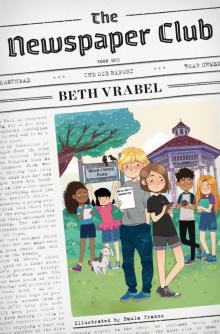 The Newspaper Club
The Newspaper Club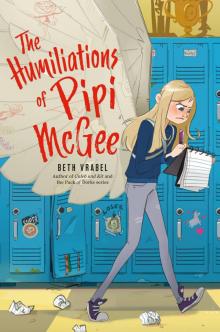 The Humiliations of Pipi McGee
The Humiliations of Pipi McGee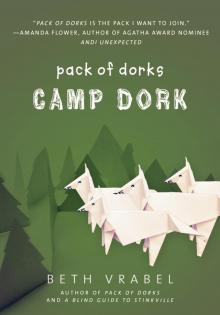 Camp Dork
Camp Dork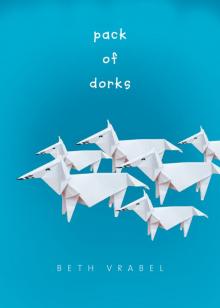 Pack of Dorks
Pack of Dorks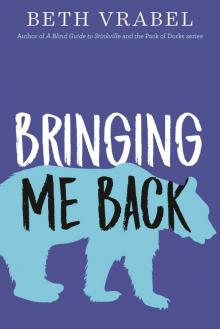 Bringing Me Back
Bringing Me Back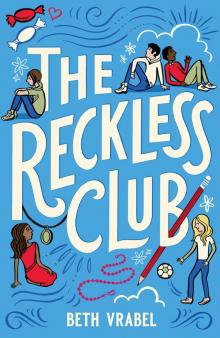 The Reckless Club
The Reckless Club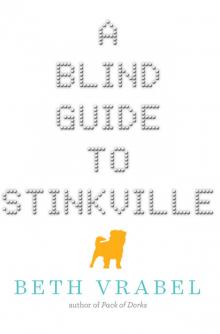 A Blind Guide to Stinkville
A Blind Guide to Stinkville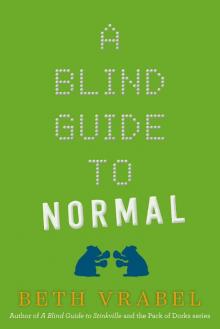 A Blind Guide to Normal
A Blind Guide to Normal Caleb and Kit
Caleb and Kit